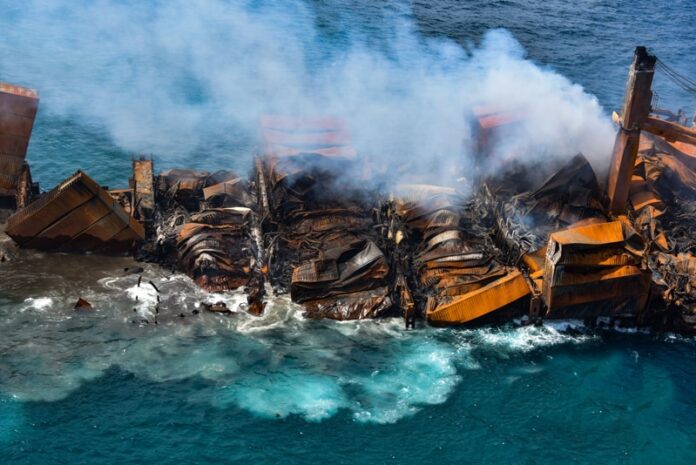By: Staff Writer
July 06, Colombo (LNW): Sri Lanka’s quest for $6.4 billion in compensation over the 2021 X-Press Pearl maritime disaster has hit a major roadblock, with the main legal case filed in Singapore now stalled due to a counter-lawsuit launched in the United Kingdom by the ship’s insurers. The delay casts uncertainty over the country’s ability to secure compensation for what has been deemed the worst marine environmental catastrophe in its history.
The Singapore-flagged container vessel X-Press Pearl caught fire on May 20, 2021, off the coast of Colombo and sank days later, releasing toxic chemicals and billions of plastic pellets into the ocean. The environmental and economic impact on Sri Lanka’s coastline, marine life, and fishing communities has been severe, with damage estimates reaching at least $6.4 billion based on expert evaluations up to late 2022.
Legal proceedings were initially launched in Singapore by the previous government, aiming to hold the shipping company accountable. However, Environment Ministry legal advisor Dammika Patabendi confirmed that progress has stalled due to counter-litigation in the UK, where insurers are attempting to limit their financial liability.
The current government is attempting to expedite the matter through the Ministry of Justice, but Attorney General Parinda Ranasinghe has cautioned that a swift resolution is unlikely. “Nobody is going to just hand over Rs. 6.4 billion,” he said, noting that compensation will require detailed legal scrutiny, similar to complex insurance claims.
Amid these international legal hurdles, a parallel legal process is unfolding in Sri Lanka. The Supreme Court is expected to rule later this month on several local cases filed by environmental groups, including one by the Centre for Environmental Justice (CEJ). CEJ Co-Founder Ravindranath Dabare said all arguments in their case have concluded, and a verdict is expected before the retirement of the Chief Justice at the end of July.
Dabare also expressed disappointment at the slow progress in Singapore, noting that earlier optimism about a faster outcome there has faded. Despite Sri Lanka not being a signatory to the international HNS (Hazardous and Noxious Substances) Convention, he remains hopeful that a favorable Supreme Court ruling can lead to internationally enforceable compensation, given the involvement of globally recognized companies.
The CEJ has also urged to initiate a probe into the handling of the disaster and the legal strategy for seeking damages. While Sri Lanka has received smaller payments for cleanup efforts and fishermen’s relief, the legal battle for the larger compensation package continues to be mired in procedural delays and jurisdictional disputes.

